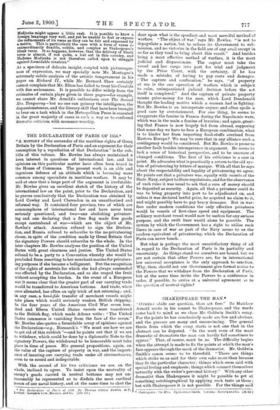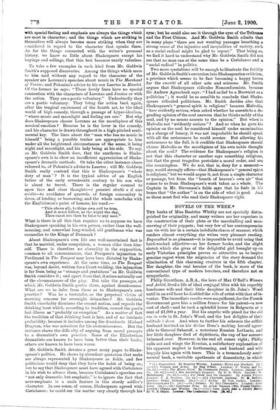SHAKESPEARE THE MAN,
OTHERS abide our question, thou art free." So Matthew Arnold wrote in his sonnet to Shakespeare, and the words come back to mind as we close Mr. Goldwin Smith's essay. For the points he has conclusively made are few and obvious, and the guesses are many and unconvincing. The general thesis from which the essay starts is not one that in the abstract can be disputed. "In the work even of the most dramatic of dramatists the man can hardly fail sometimes to appear." That, of course, must be so. The difficulty begins when the attempt is made to fix the points at whibh the man's face appears through the mask of the dramatist. Mr. Goldwin Smith's canon seems to be threefold. "There are things which strike us as said for their own sake more than because they fit the particular character; things which seem said with special feeling and emphasis; things which connect themselves naturally with the writer's personal history." With any other dramatist than Shakespeare it might be possible to get at something autobiographical by applying such tests as these ; but with Shakespeare it is not possible. For the things said • Shakespeare : :he Iron. 46E4(11,4u Smith. Toronto : Moran and Co. (2s. &I)
with special feeling and emphasis are always the things which are most in character; and the things which are striking in themselves will always become more striking when they are considered in regard to the character that speaks them. As for the things connected with the writer's personal history, we brow so little about Shakespeare except his buyings and se]iings, that this test becomes nearly valueless.
To take a few examples in each kind from Mr. Goldwin Smith's supposed discoveries. Among the things which seem to him said without any regard to the character of the speaker are Lorenzo's speeches about music in The Merchant of Venice; and Polonius's advice to his son Laertes in Hamlet. Of the former he says : "These lovely lines have no special connection with the characters of Lorenzo and Jessica or with the action. They are a poetic voluntary." Undoubtedly they are a poetic voluntary. They bring the action back again, after the tragical excitement of the fourth act, to the ideal world of high comedy, through a passage of hyper-idealism, "where music and moonlight and feeling are one." But why does Shakespeare choose Lorenzo as the mouthpiece of this musical emotion Because he is the lover in the comedy, and his character is drawn throughout in a high-pitched senti- mental key. The lines about the "man who has no music in himself" being a possible traitor are appropriate to him under all the heightened circumstances of the scene, it being night and moonlight, and his lady being at his side. To say, as Mr. Goldwin Smith does, that the anathema is Shake- speare's own is to show an insufficient appreciation of Shake- speare's dramatic methods. Or take the other instance above referred to, of Polonius's advice to Laertes ; will Mr. Goldwin Smith really contend that this is Shakespeare's "whole duty of man " ? It is the typical advice of an English father of the early seventeenth century to his son who is about to travel. There is the regular counsel to open face and close thoughts—i pensieri stretti e il vise seioito—to avoidance of quarrels, of foreign corccombry in dress, of lending or borrowing, and the whole concludes with the Englishman's point of honour, his word This above all; to thine own self be true,
And it must follow, as the night the day, Thou must not then be false to any man."
What is there in all this that requires us to suppose we have Shakespeare speaking in his own person, rather than the well- meaning, and somewhat long-winded, old gentleman who was counsellor to the Kings of Denmark ?
About Shakespeare's own life one well-ascertained fact is that he married, under compulsion, a woman older than him- self. There is therefore no absurdity in the supposition, common to all commentators, that Prospero's injunction to Ferdinand in The Tempest may have been dictated by Shake- speare's own experience. At the same time, as The Tempest was, beyond doubt, written fora Court wedding, the injunction is far from being as "strange and gratuitous "as Mr. Goldwin Smith considers it ; and apart from that, it arises naturally out of the circumstances of the play. But take the passages, of which Mr. Goldwin Smith quotes three, against drunkenness. What are we to infer from these as to Shakespeare's own practice ? Was he a teetotaler, or the perpetual victim of morning remorse for overnight debauches ? Mr. Gold.win. Smith charitably dismisses the second notion, and regards the drinking bout which, according to tradition, caused the poet's last illness as "probably an exception." As a matter of fact the tradition of that drinking bout is late, and of no intrinsic probability, because it includes among the drunkards Michael Drayton, who was notorious for his abstemiousness. But the instance shows the difficulty of arguing from moral precepts to a dramatist's own practice. Some of the Elizabethan dramatists are known to have been better than their books, others are known to have been worse.
Mr. Goldwin Smith devotes a great many pages to Shake- speare's politics. He shows by abundant quotation that mobs are always represented by Shakespeare as fickle, and few politicians would deny that they have the habit of being so; but to say that Shakespeare must have agreed with Coriolanus in his wish to silence them, because Coriolanus's speeches are "not only dramatic, but emphatic," is to ignore the fact that over-emphasis is a main feature in this sturdy soldier's character. In one sense, of course, Shakespeare agreed with Coriolanus : he could see the matter very clearly through his
eyes; but he could also see it through the eyes of the Tribunes and the First Citizen. And Mr. Goldwin. Smith admits that in many plays "there are not wanting passages breathing a strong sense of the injustice and inequalities of society, such as a social radical might be glad to repeat." That being so, we find it hard to understand why Mr. Goldwin Smith did not see that no man can at the same time be a Coriolanus and a "social radical" in politics.
Two more quotations will be enough to illustrate the futility of Mr. Goldwin Smith's excursion into Shakespearian criticism, a province which seems to be fast becoming a happy haven for the emeriti of all other arts and sciences. Mr. Smith argues that Shakespeare ridicules Nonconformists, because Sir Andrew Agnecheek says: "I had as lief be a Brownist as a politician " ; it would be as sensible to conclude that Shake- speare ridiculed politicians. Mr. Smith decides also that Shakespeare's "general spirit is religions" because Malvolio, "here evidently serious, when asked whether he assents to a de- grading opinion of the soul answers that he thinks nobly of the soul, and by no means assents to the opinion." But when is Malvolio not "evidently serious " ? And as when he gave his opinion on the soul he considered himself under examination on a charge of lunacy, it was not improbable he should speak with all the seriousness he could muster. But allowing his seriousness to the full, is it credible that Shakespeare should choose Malvolio as the mouthpiece of his own noble thought about the soul? The evidence for Shakespeare's religion is not that this character or another says something religious, but that the great tragedies postulate a moral order, and are else meaningless. We do not, that is, deny for a moment-- nay, would strongly affirm—that Shakespeare's "general spirit is religious," but we would argue it, not from a single character or passage, but from the "breath of heaven's own air" that comes to us from Shakespeare's work taken as a whole. The Captain in Mr. Stevenson's fable says that he feels Lu his bones that "the author" is on the side of what is good. And so those must feel who read their Shakespeare right.



































 Previous page
Previous page